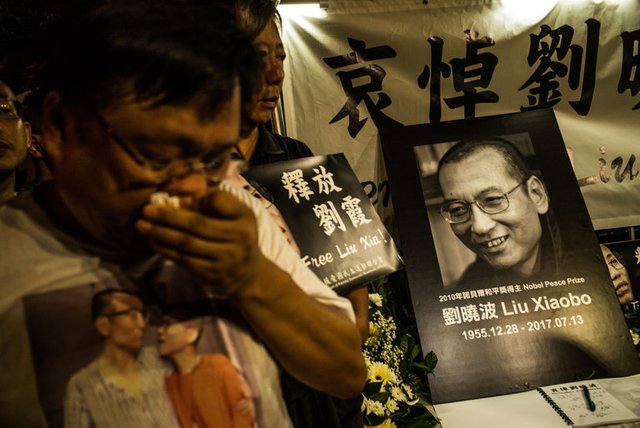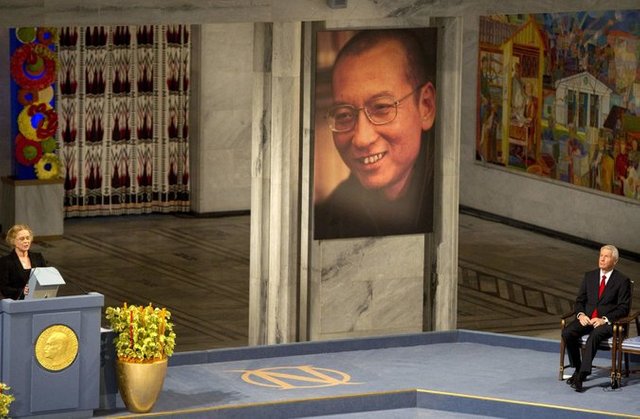Liu Xiaobo, Chinese Dissident Who Won Nobel While Jailed, Dies at 61

BEIJING — Liu Xiaobo, the renegade Chinese intellectual who kept vigil at Tiananmen Square in 1989 to protect protesters from encroaching soldiers, promoted a pro-democracy charter that brought him a lengthy prison sentence and was awarded the Nobel Peace Prize while locked away, died under guard in a hospital on Thursday. He was 61.
The Bureau of Justice in Shenyang, the city in northeastern China where Mr. Liu was being treated for liver cancer, announced his death on its website.
The Chinese government revealed he had cancer in late June, only after the illness was virtually beyond treatment. Officially, Mr. Liu gained medical parole. But even as he faced death, he was kept silenced in the First Hospital of China Medical University, still a captive of the authoritarian controls that he had fought for decades.
He was the first Nobel Peace Prize laureate to die in state custody since Carl von Ossietzky, the German pacifist and foe of Nazism who won the prize in 1935 and died under guard in 1938 after years of maltreatment.
Continue reading the main story
“After multiple treatments, Liu Xiaobo’s condition continued to deteriorate,” the Shenyang Bureau of Justice said in a statement. “On July 10, he entered a state of rescue and intensive care, and on July 13, he died due to multiple organ failure after attempts to save him failed.”
The police in China have kept Mr. Liu’s wife, Liu Xia, under house arrest and smothering surveillance, preventing her from speaking out about Mr. Liu’s belated treatment for cancer.
“Can’t operate, can’t do radiotherapy, can’t do chemotherapy,” Ms. Liu said in a brief video message to a friend when her husband’s fatal condition was announced. The message quickly spread online.
Mr. Liu’s illness elicited a deluge of sympathy from officials, friends, Chinese rights activists and international groups, who saw him as a fearless advocate of peaceful democratic change.
“The reaction to his illness shows how much he was respected,” said Cui Weiping, a former professor of literature in Beijing who knew Mr. Liu and now lives in Los Angeles. “People from all walks of life — friends, strangers, young people — have been outraged to hear that someone with terminal cancer was kept locked up till he died.”

Zeid Ra’ad al-Hussein, the United Nations high commissioner for human rights, said on Thursday, “The human rights movement in China and across the world has lost a principled champion who devoted his life to defending and promoting human rights, peacefully and consistently, and who was jailed for standing up for his beliefs.”
Terry E. Branstad, the United States ambassador to China, said in an emailed statement, “China has lost a deeply principled role model who deserved our respect and adulation, not the prison sentences to which he was subjected.”
He added, “We call on China to release all prisoners of conscience and to respect the fundamental freedoms of all.”
Mr. Liu was arrested most recently in 2008, after he helped initiate Charter 08, a bold petition calling for democracy, the rule of law and an end to censorship.
A year later, a court in Beijing tried and convicted Mr. Liu on a charge of inciting subversion. The petition and essays he wrote in which he upbraided and mocked the Chinese government were cited in the verdict. Mr. Liu responded to his trial with a warning about China’s future.
“Hatred can rot a person’s wisdom and conscience,” he said in a statement he prepared for the trial. “An enemy mentality will poison the spirit of a nation and inflame brutal life and death struggles, destroy a society’s tolerance and humanity, and hinder a country’s advance toward freedom and democracy.”
By the time of the trial, Mr. Liu was already China’s best-known dissident, and his fame grew even more when he was awarded the Nobel Peace Prize in 2010 while imprisoned in northeast China.
After his death was announced, Berit Reiss-Andersen, the chairwoman of the Norwegian Nobel Committee, said the Chinese government “bears a heavy responsibility for his premature death.”
“Liu Xiaobo will remain a powerful symbol for all who fight for freedom, democracy and a better world,” Ms. Reiss-Andersen said by email. “He was truly a prisoner of conscience, and he paid the highest possible price for his relentless struggle.”
Mr. Liu could not collect the Nobel Prize himself, and he was represented at the ceremony by an empty chair. His statement for his trial, which he was not allowed to read out, served in his absence as his Nobel lecture.

“Xiaobo was wedded both psychically and physically to China and its fate,” Geremie R. Barmé, an Australian Sinologist and a close friend of Mr. Liu’s, wrote in a tribute before Mr. Liu’s death. “In the end, his words and deeds may have garnered him a Nobel Prize, yet in an authoritarian system, one that since 1989 has oscillated merely between the poles of the cruel and the pitiless, they sealed his fate.”
Confrontation and detention were nothing new to Mr. Liu.
He was born on Dec. 28, 1955, in Jilin Province, in northeast China. The son of a professor who remained loyal to the Communist Party, Mr. Liu made a vocation out of obdurate opposition to authoritarianism.
“He was a dissident even among dissidents,” Yu Jie, a friend and biographer, said. Mr. Yu now lives in the United States.
He added, “Liu Xiaobo was willing to criticize himself and reflect on his actions in a way that even many activists in the democracy movement can’t.”
Mr. Yu recalled the first time Mr. Liu spoke to him over the phone, in about 1999. “He said, ‘I’ve read your book, and there’s a lot I disagree with,’ ” Mr. Yu said. “He criticized me for about half an hour.”
Mr. Liu started out as a notoriously abrasive literary critic in Beijing in the 1980s. He was called a “dark horse” who bridled at intellectual conformity, even in the name of reform. But he was increasingly drawn into political questions as Deng Xiaoping, the Communist leader, resisted matching economic liberalization with political transformation.
In 1989, he was a visiting scholar at Columbia University when students in Beijing occupied Tiananmen Square to demand democratic changes and an end to party corruption. He returned to Beijing to support the protests. He later described that time as a turning point, one that ended his academic career and set him irrevocably into a life of political opposition.
Mr. Liu’s sympathy for the students was not unreserved; he eventually urged them to leave Tiananmen Square and return to their campuses. As signs grew that the Communist Party leadership would use force to end the protests, Mr. Liu and three friends, including the singer Hou Dejian, held a hunger strike on the square to show solidarity with the students, even as they advised them to leave.
“If we don’t join the students in the square and face the same kind of danger, then we don’t have any right to speak,” Mr. Hou quoted Mr. Liu as saying.
When the army moved in, hundreds of protesters died in the gunfire and the chaos on roads leading to Tiananmen Square. But without Mr. Liu and his friends, the bloodshed might have been worse. On the night of June 3, they stayed in the square with thousands of students as tanks, armored vehicles and soldiers closed in.

UPVOTE & FOLLOW